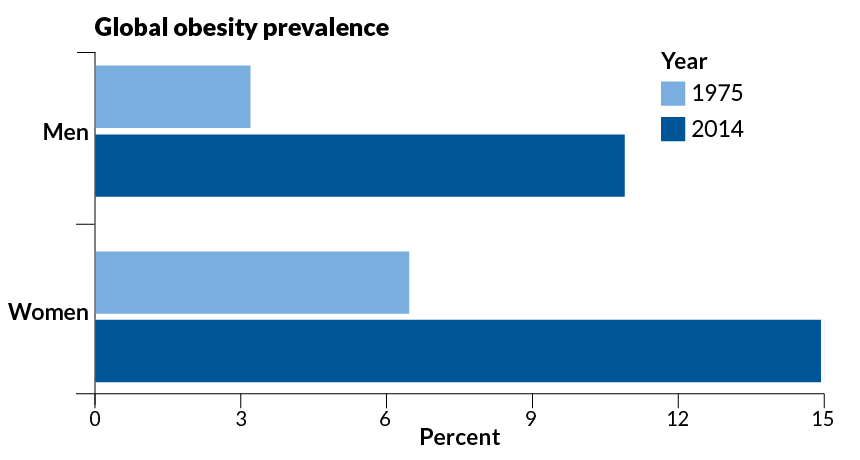Around 105 million people were considered obese in 1975, according to worldwide body mass index (BMI) measurements. As recently as 2014, the number increased to more than 640 million, and that’s only including adult men and women. But, despite this, there’s a silver lining: people are also living around ten years longer than before.
This may not sound like it makes sense. The world has gained nearly 3 and a half pounds of fat per decade, which is fittingly about a half a gallon of ice-cream. And yet people on average are living longer, from around 60 years old to around 70. But this data, provided by The Lancelet, may prove multiple things that we’ve known for a long time:
1) The Data Is Faulty
Can you ever remember being asked to give your height and weight data to anyone besides your doctor? Has your doctor mentioned giving anonymous data regarding your measurements to a research project? Often scientists don’t actually get data from every single person they can: they take data from a collection of people and then apply different calculations based on population and global trends.
According to Science News, this is exactly how this data was compiled: researchers analyzed four decades of height and weight for more than 19 million adults and then applied calculations that matched global trends. So this is far less an exact number of what the 7 billion people in the world are like and more a gross estimation.
3) The Perception of Obesity
Another problem is the perception of obesity. Many people look at the results, but rarely does anyone look at the how of it all. Is that person obese because they have an eating disorder? Or is it because they have a hormonal or metabolic inbalance? Are they taking a medicine that increases hunger Or slows down their metabolism? Are they unable to exercise much thanks to a specific injury? Is it something else? Or even a combination of the above?
We often shame the idea of being obese, especially when it affects us: that person taking extra seats on the train, or that person who drives around in a motorized wheelchair knocking into things. But they may have obesity for a different reason than we think.
3) Life Expectancy If Affected By Many Things
While weight factors in heavily regarding life expectancy, there are also other things that affect our lifespans. Crime, unhealthy habits, safety conditions, pollution and quality of food all affect how long we live, and obesity is just one of many things that add or take away years from our lives.
4) The BMI is Inherently Problematic.
You know who’s considered overweight or obese? Dwayne “The Rock” Johnson. Also Vin Diesel. Also the epitome of power, Governator Ah-nold. Are they really? No. But according to the BMI obesity scale, they are.
One big problem with the body mass index measurement is that it doesn’t always account for different factors. It’s a very standard way to measure obesity: if you’re a certain height and a certain weight, then you’re a certain level of obesity. But, as we’ve come to know over the last few decades, there’s only one thing that’s absolutely certain: everybody’s body is different.
Years ago, we were absolutely sure that everyone should drink a certain amount of water a day. Now we know that that’s wrong: it depends on your body, the environment, and a few other factors. Years ago, we thought milk was good for everyone. And then we realized it’s bad for anyone who’s an adult. And then we learned that perhaps one third of the world is immune to dairy intolerance due to a number of factors. So bad for most, but not for all.
This is the same with the BMI: obesity depends on body type as much as measurements. To a lesser extent it includes bone density and liquid weight, but to a larger degree it includes both body fat and muscle density. It’s why according to the BMI the Fast 7 stars seem to be overweight even when they’re not.
The BMI also misses that the good and bad qualities of so-called obesity change depending on age, race, lifestyle and body type. Being too low on the obesity scale of the BMI is actually worse than being overweight, according to a NY Times article. Having extra weight may also help some survive longer in certain conditions around the world. Having a fit lifestyle and extra weight also is different than being “normal” sized and lazy, or having unhealthy habits.
So are things getting worse? Maybe, maybe not. The only certain thing is how uncertain data can be. Before getting worried or preachy, we need to take a step back, look at the factors, and make our real observations from what’s actually relevant.
Source: The Lancelet via Science News

